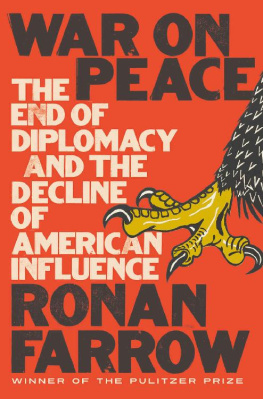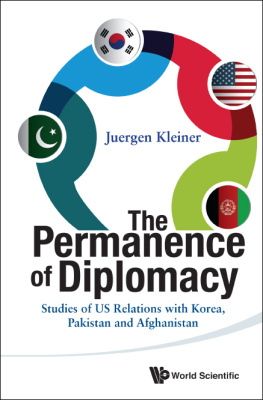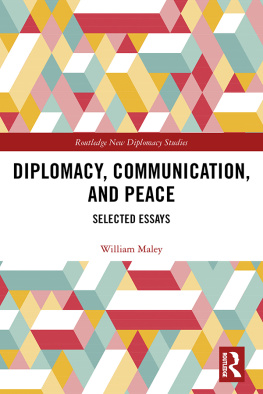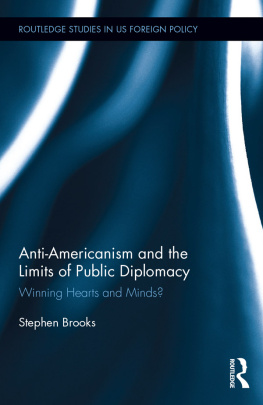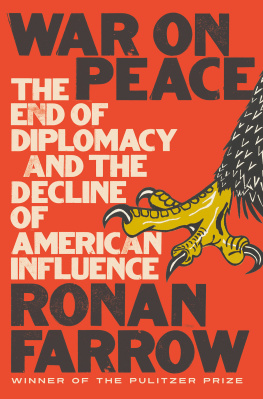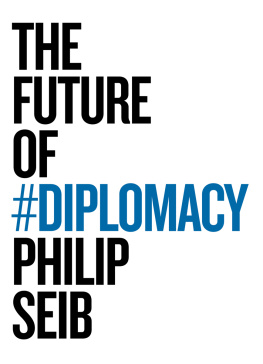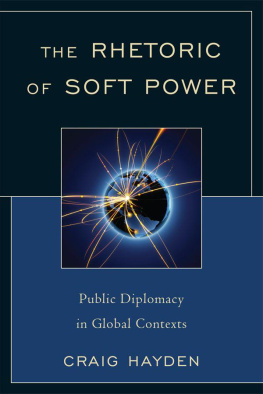
For Mom.
CONTENTS
AMMAN, JORDAN, 2017
[A]ppoint an ambassador who is versed in all sciences, who understands hints, expressions of the face and gestures.... The army depends on the official placed in charge of it... peace and its opposite, war, on the ambassador. For the ambassador alone makes and separates allies; the ambassador transacts that business by which kings are disunited or not.
THE MANUSMRITI, HINDU SCRIPTURE, CA. 1000 BCE
T HE DIPLOMAT HAD NO CLUE that his career was over. Before stepping into the secure section of the American embassy, hed slipped his phone into one of the cubbies on the wall outside, according to protocol. The diplomat had been following protocol for thirty-five years, as walls crumbled and empires fell, as the world grew smaller and cables became teleconferences and the expansive language of diplomacy reduced to the gnomic and officious patter of email. He had missed a few calls and the first email that came in was terse. The director general of the Foreign Service had been trying to reach him. They needed to speak immediately.
The diplomats name was Thomas Countryman, which seems like it must be made up, but is not. He was sitting at a borrowed desk in the political section at the heart of the low, sprawling embassy complex in Jordans posh Abdoun neighborhood. The embassy was an American contractors studied homage to the Middle East: sand-colored stone, with a red diamond-shaped motif on the shatterproof windows that said, local, but not too local. Like most American embassies in this part of the world, there was no avoiding the sense that it was a fortress. Wed build a moat if we could, a Foreign Service officer stationed there once muttered to me as our armored SUV made its way through the facilitys concrete and steel barriers, past armored personnel carriers full of uniformed soldiers.
It was January 25, 2017. Countryman was Americas senior official on arms control, a mission that was, quite literally, a matter of life and death. He oversaw the State Departments work on the fragile nuclear deal with Iran, and its response to apocalyptic threats from the regime in North Korea. His trip that January was a moonshot: the latest in decades of negotiations over nuclear disarmament in the Middle East. Nuclear-free zones had been established around the world, from Latin America to parts of Africa and Europe. No one thought Israel was going to suddenly surrender its nukes. But incremental stepslike getting states in the region to ratify treaties they had already signed banning nuclear tests, if not the weapons themselvesmight someday be achievable. Even that was a fairly quixotic quest, because the Arabs and the Israelis have radically different views. Tom Countryman had a flair for understatement.
The work this mission entailed was classic, old-school diplomacy, which is to say it was frustrating and involved a lot of jet lag. Years of careful cajoling and mediating had brought the Middle Eastern states closer than ever to at least assenting to a conference. There was dialogue in the hopes of future dialogue, which is easier to mock than to achieve. That evening, Countryman and his British and Russian counterparts would meet officials from Egypt, Jordan, Saudi Arabia, and Kuwait to press the importance of nonproliferation diplomacy. The next day, hed go on to Rome for a meeting with his counterparts from around the world. It was an important meeting, he told me later, if not a decisive one. He punctuated this with a hollow little laugh, which is not so much an indictment of the comedic qualities of Tom Countryman as it is an indictment of the comedic qualities of nuclear proliferation in the Middle East.
Countryman had landed in Amman the previous day and checked into the InterContinental. Then he went straight to a meeting with his Arab League counterpart over coffee and cigarettes. Countryman took the coffee mazboot, or black with sugar, in the local fashion. For the cigarettes, he favored Marlboro Lights, as often as possible. (A life of travel and negotiation hadnt been conducive to quitting. Im trying, he said later, before vaping unhappily.)
The next day, it was over to dinner with British and Russian officials. Not all of Countrymans counterparts had his years of experience and relationships. The British point person had changed several times in the preceding years. His Russian counterpart had sent a deputy. That would make it harder. In high-wire acts of persuasion, every ounce of diplomatic experience in the room counted.
Diplomats perform many essential functionsspiriting Americans out of crises, holding together developing economies, hammering out deals between governments. This last mandate can sometimes give the job the feel of Thanksgiving dinner with your most difficult relatives, only lasting a lifetime and taking place in the most dangerous locations on earth. A diplomats weapon is persuasion, deployed on conversational fronts at the margins of international summits, in dimly lit hotel bars, or as bombs fall in war zones.
Tom Countryman had, since joining the Foreign Service in 1982, weathered all of these vagaries of diplomacy. He had served in the former Yugoslavia and in Cairo during Desert Storm. He had emerged unscathed from travels through Afghanistan and the bureaucracy of the United Nations. Hed picked up Serbian and Croatian, as well as Arabic, Italian, and Greek along the way. Even his English carried a puzzling accent from all of those places, or maybe none of them at all. Tom Countryman had a flat, uninflected voice and an odd way with vowels that made him sound like a text-to-speech application or a Bond villain. An internet troll excoriating him as one of those faceless bureaucrats in the State Department called it a strange bureaucratic accent I guess you obtain by not being around real people your whole working career, which encapsulates another facet of being a diplomat: they work in the places the military works, but theyre not exactly welcomed home with ticker-tape parades.
But this particular troll was wrong: Tom Countryman was not faceless. He had a face, and not one youd lose in a crowd. A slight man with a flinty, searching gaze, he often wore his salt-and-pepper hair clipped short in the front and long behind, tumbling gloriously over his neat suits. It was a diplomats mullet: peace in the front, war in the back. (Sick mane, one conservative outlet crowed. King of the party.) He had a reputation for frank, unbureaucratic answers in public statements and Senate hearings. But he never strayed from his devotion to the State Department and his belief that its work protected the United States. In a work of fiction, naming him Countryman would have been annoying as hell.
S ITTING UNDER THE FLUORESCENT LIGHTS of the political section that day in Jordan, Countryman looked at the email for a moment and then sent back the number of his desk. The director general of the Foreign Service, Ambassador Arnold Chacon, called back quickly. This is not happy news, Chacon began, as Countryman recalled the conversation. The White House, Chacon said, had just accepted Countrymans resignation, effective as of the end of the week. Chacon was sorry. I wasnt expecting that it was about me, Countryman remembered between puffs at his e-cigarette. I didnt have any idea. But there he was, a few hours before a critical confrontation with foreign governments, getting shit-canned.
When theres a changing of the guard in Washington, Senate-confirmed officials submit brief, one- or two-sentence notes tendering their resignations. Its a formality, a tradition. It is almost universally assumed that nonpartisan career officers like Tom Countryman will remain in place. This is a practical matter. Career Foreign Service officers are the foundation of the American government abroad, an imperfect structure that came to replace the incompetence and corruption of the spoils system. Only career officials have the decades of institutional knowledge required to keep the nations agencies running, and while every administration takes issue with the intransigence and unaccountability of these lifers, no one could remember any administration dismissing them in significant numbers.
Next page
